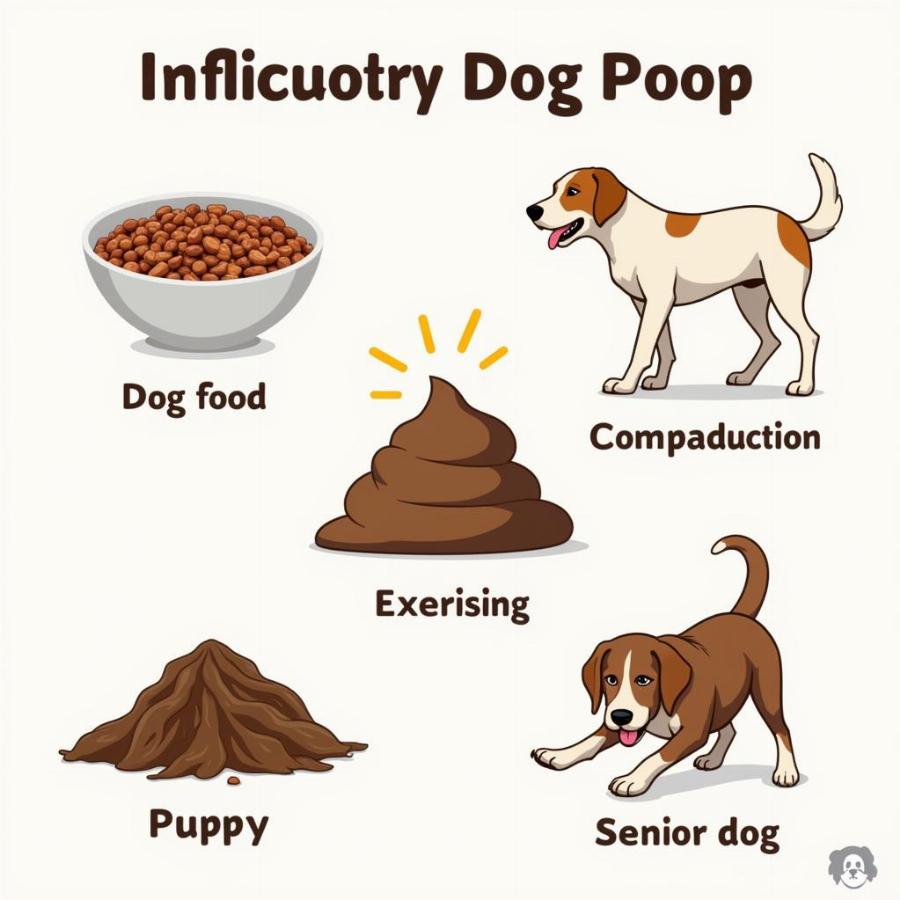Understanding your dog’s pooping habits can be a surprisingly insightful window into their overall health and well-being. While “dogs pooping calendar” might sound a bit unusual, keeping a mental note of your furry friend’s bathroom breaks can be extremely beneficial. It allows you to detect potential issues early on and ensure your dog is happy and healthy. This article delves into the importance of observing your dog’s pooping schedule, what’s considered normal, and when it’s time to consult a veterinarian.
A regular dog pooping schedule is crucial for their digestive health. While every dog is unique, most healthy adult dogs poop once or twice a day, typically after meals. Puppies, with their faster metabolisms, might poop even more frequently. Factors like diet, exercise, and age can all influence a dog’s bowel movements. Observing any changes in their “dogs pooping calendar,” like increased or decreased frequency, changes in consistency, or the presence of blood or mucus, can indicate underlying health issues.
Decoding Your Dog’s Pooping Schedule: Frequency and Consistency
How often should your dog poop? While there’s no strict “dogs pooping calendar” set in stone, consistency is key. If your dog usually poops twice a day and suddenly switches to once a day or vice versa, it’s worth paying attention. Similarly, a sudden change in consistency, from firm to watery or very hard, can also be a red flag.
What Does Normal Dog Poop Look Like?
Healthy dog poop is typically chocolate brown, firm but not too hard, and log-shaped. It should be easy to pick up and leave minimal residue. If your dog’s poop is consistently loose, watery, hard, black, or contains blood or mucus, it’s essential to contact your vet.
Factors Influencing Your Dog’s Pooping Habits
Several factors can impact your dog’s “pooping dog calendar.” Diet plays a crucial role. High-fiber diets can lead to more frequent bowel movements, while low-fiber diets can cause constipation. Exercise also helps stimulate bowel movements. Age is another significant factor. Puppies and senior dogs tend to have different pooping schedules compared to adult dogs.
 Factors Influencing Dog Poop
Factors Influencing Dog Poop
When to Worry About Your Dog’s Poop
While occasional variations in your dog’s pooping schedule are normal, certain signs warrant concern. These include straining to poop, frequent unsuccessful attempts to defecate, bloody stool, black stool (which could indicate internal bleeding), mucus in the stool, vomiting, lethargy, loss of appetite, and significant changes in pooping frequency.
Maintaining a Healthy Dog Pooping Schedule
You can take several steps to support your dog’s digestive health and maintain a regular “dogs pooping calendar.” Providing a balanced diet rich in fiber, ensuring adequate hydration, and providing regular exercise are all essential. You can also consider adding probiotics to your dog’s diet to support gut health.
How Much Should My Dog Poop?
The amount your dog poops depends on their size, diet, and activity level. Larger dogs naturally produce more poop than smaller dogs. Similarly, dogs on high-fiber diets will produce more waste than those on low-fiber diets.
Conclusion
Paying attention to your “dogs pooping calendar” is a simple yet effective way to monitor their health. While there’s no universal schedule, understanding your dog’s individual rhythm and observing any significant deviations can help you detect potential health problems early on. Remember, if you’re ever concerned about your dog’s poop, it’s always best to consult your veterinarian. They can provide a proper diagnosis and recommend the appropriate course of action.
FAQ
- Is it normal for my dog to poop more than twice a day? While once or twice a day is typical, some dogs might poop more frequently, especially if they’re puppies or on a high-fiber diet. Consult your vet if you’re concerned.
- What does green dog poop mean? Green poop can sometimes indicate that your dog has eaten too much grass or that their food is moving through their digestive system too quickly.
- Why is my dog’s poop white? White, chalky poop can be a sign of a problem with the pancreas or liver and requires veterinary attention.
- Can stress affect my dog’s pooping habits? Yes, stress can definitely impact a dog’s digestive system and lead to changes in their bowel movements.
- Should I be worried if my dog hasn’t pooped in two days? If your dog seems uncomfortable or is straining to poop, it’s crucial to contact your veterinarian.
- What should I do if my dog’s poop has blood in it? Blood in your dog’s stool can be a sign of several different health issues, some serious. Contact your vet immediately.
- Can medications affect my dog’s pooping schedule? Yes, certain medications can cause changes in bowel movements, including diarrhea or constipation.
Related Articles You Might Find Helpful
Beaut Dogs is your trusted source for comprehensive and reliable information on all aspects of dog care. We offer expert advice on everything from choosing the right breed to providing the best possible care. When you need assistance, feel free to contact us via Email at [email protected] to get detailed and accurate answers from Beaut Dogs.